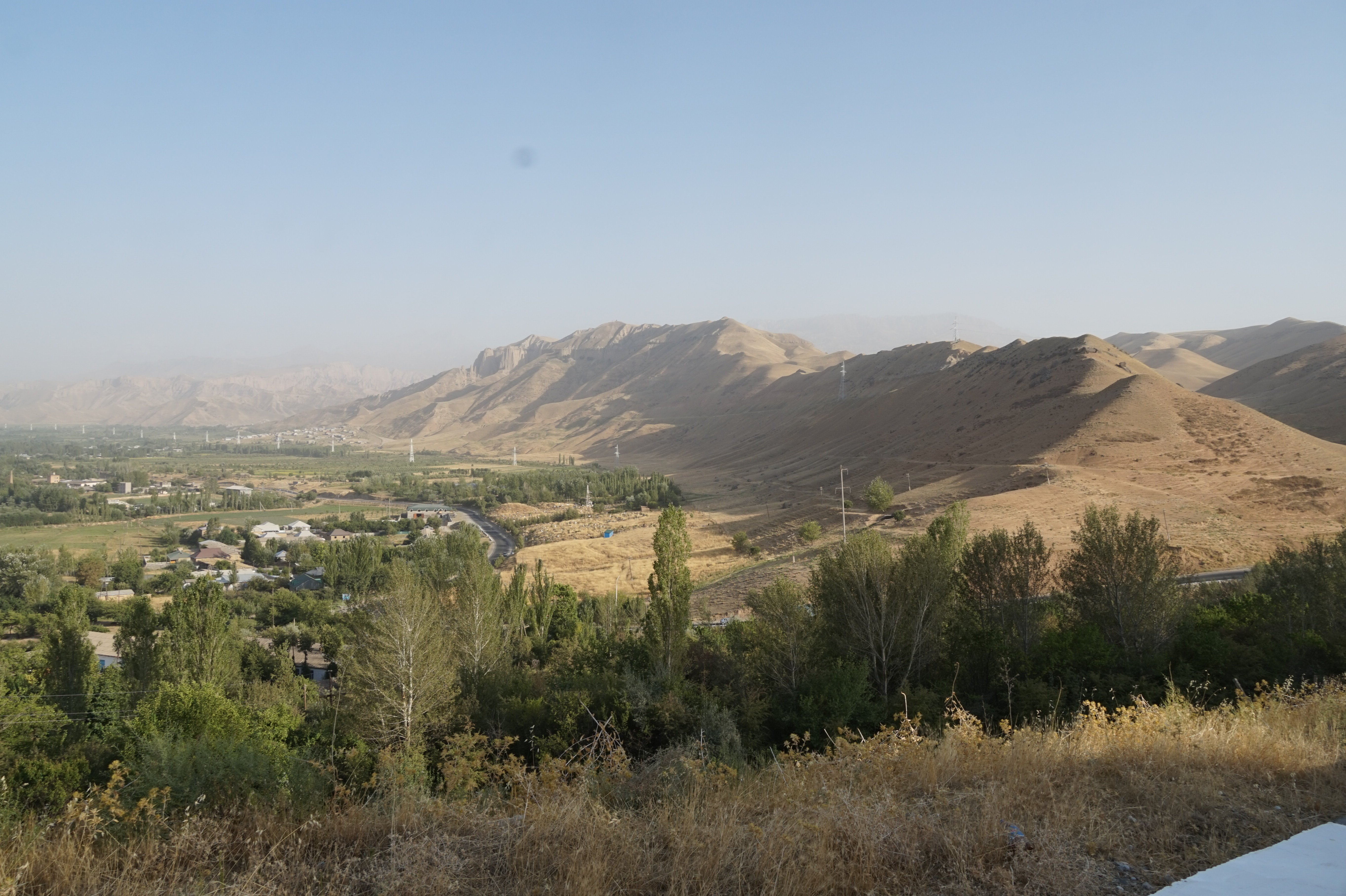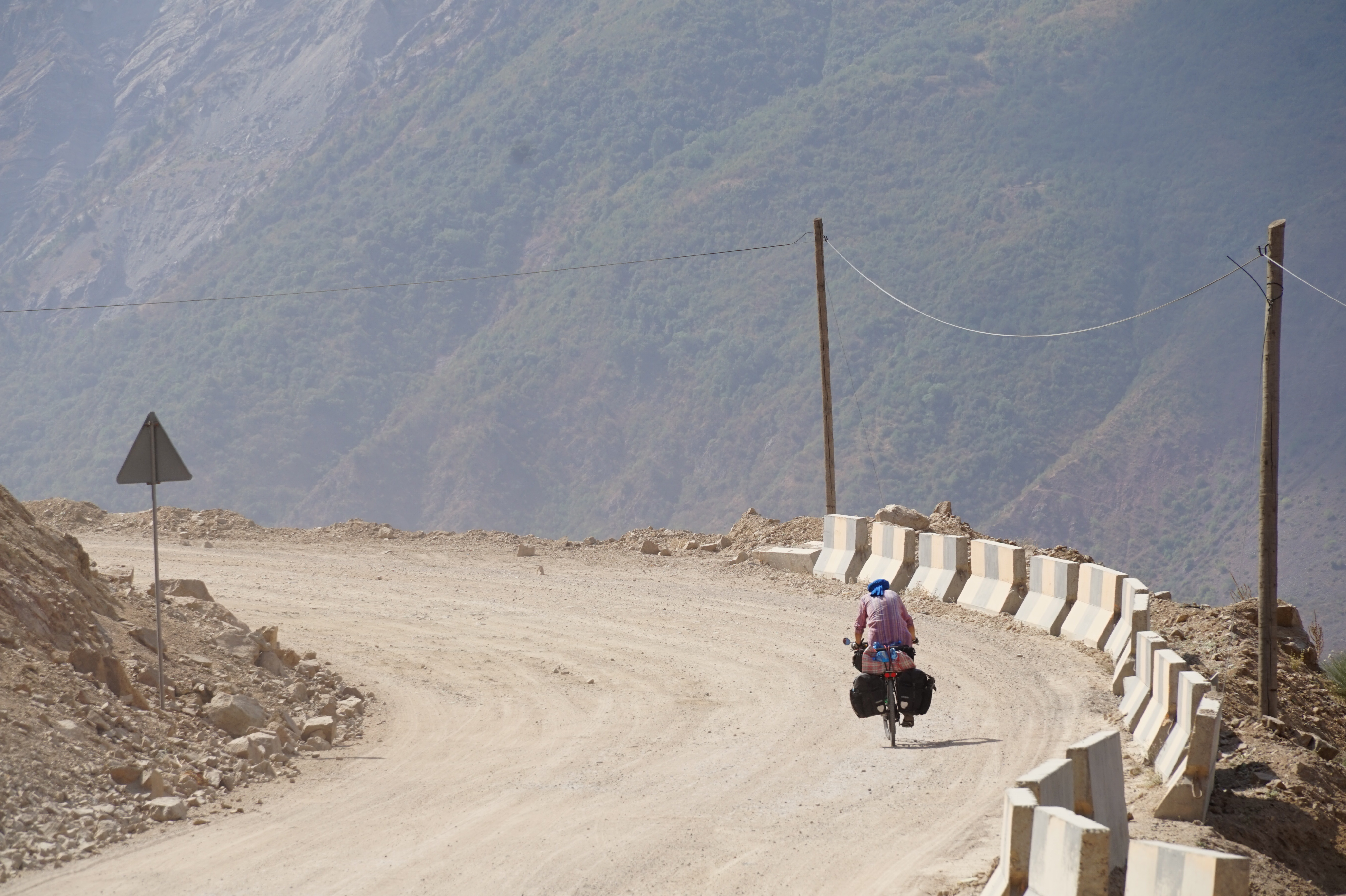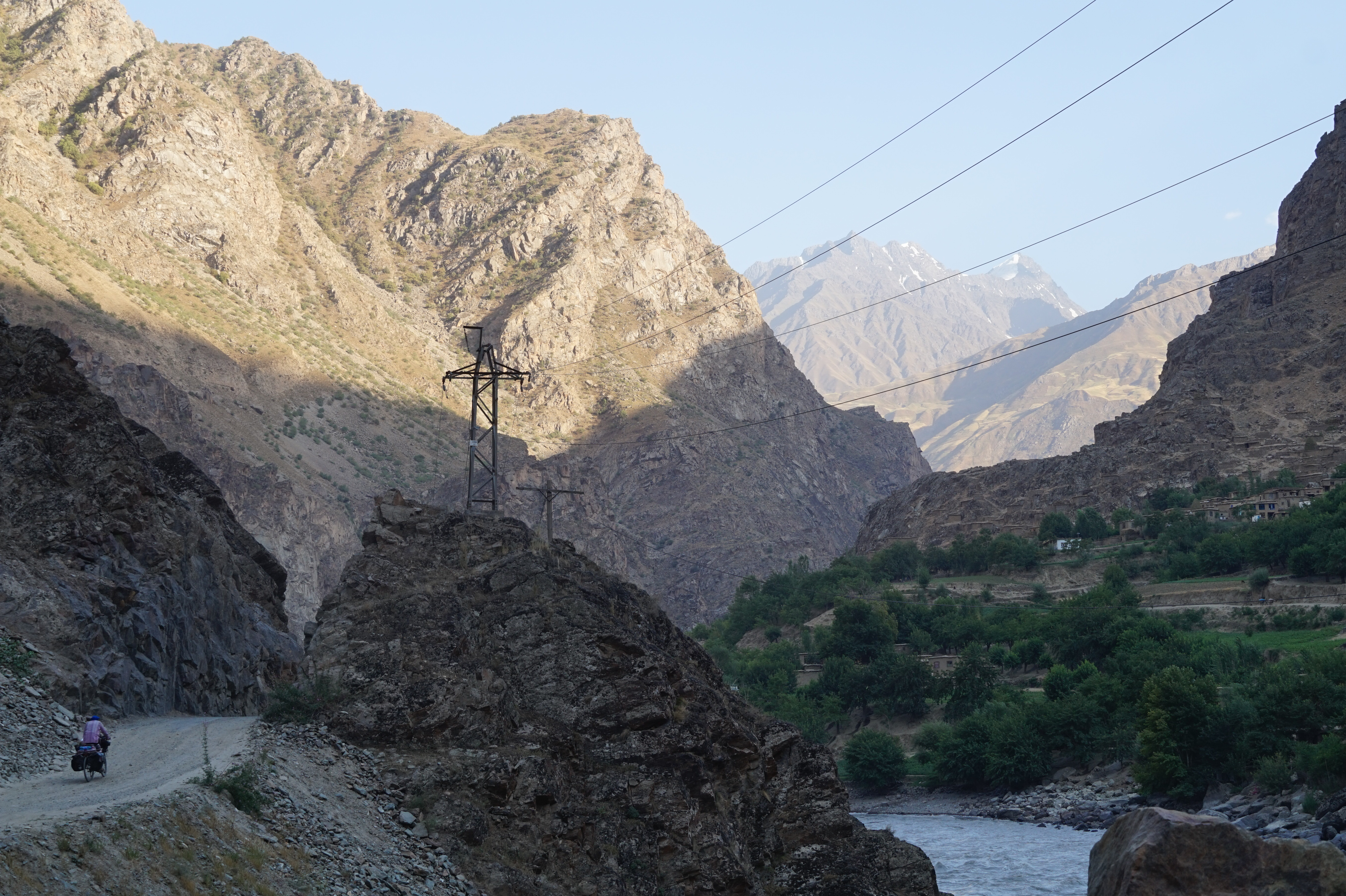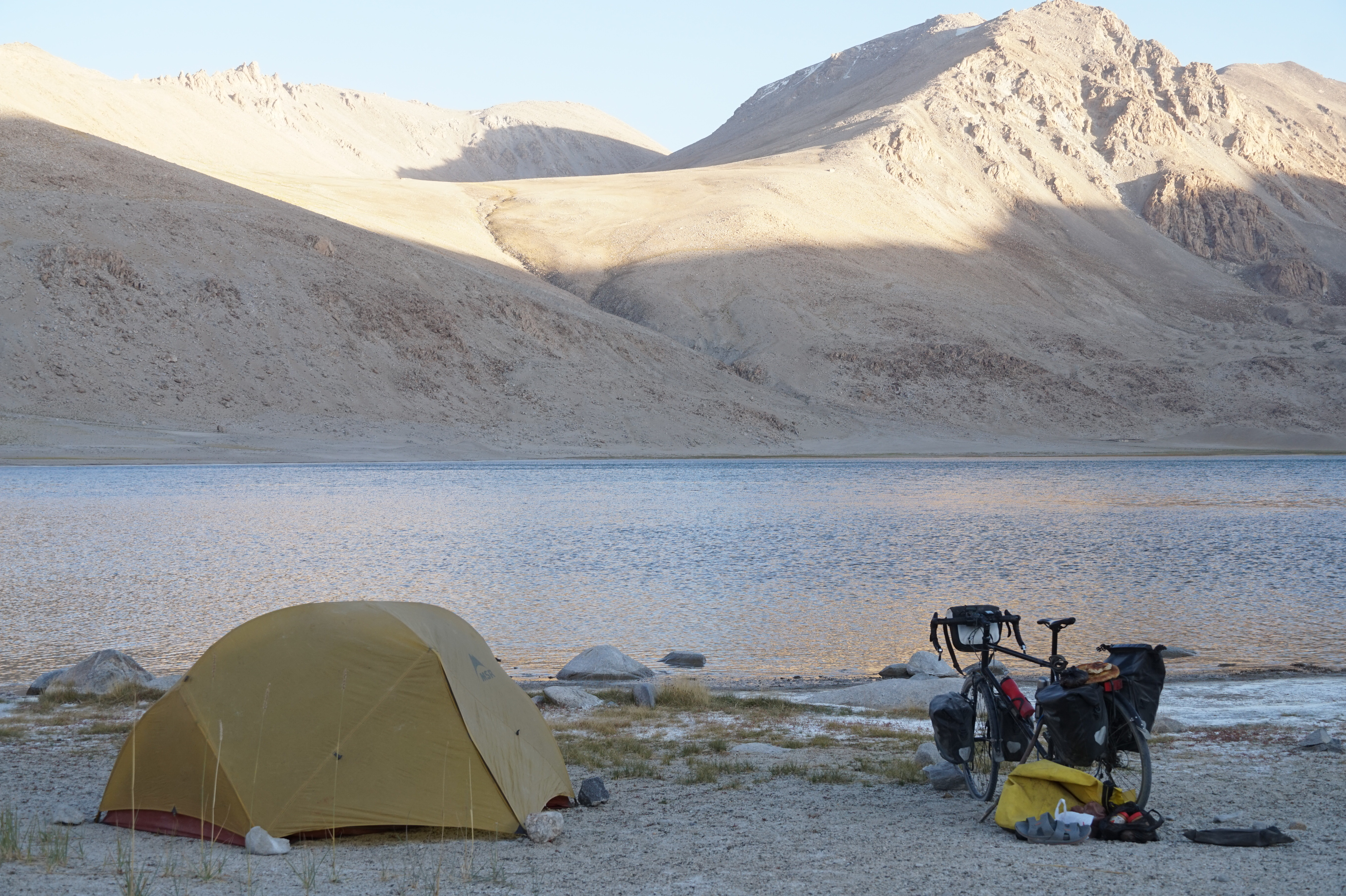A Tale of Tajikistan
November 10th, 2019
The border official handed me back my freshly stamped passport with a smile. “Welcome to Tajikistan!”, he gleamed. I was suspicious. A busy yet efficient border crossing with friendly and welcoming officials? Seems too good to be true. But here I was, rolling effortlessly into Tajikistan. My face lit up with a grin, and I felt relieved. The desert was behind me and the mountains ahead. I needed this change.
I found a lone tree off the side of the road and pulled over to make lunch. The tree’s wide branches provided an umbrella of shade as I sliced up vegetables and sausage. I was surrounded by quiet farm fields and rolling green hills. The only sounds breaking the silence were the leaves of the tree rustling in the breeze and the chopping of my knife on my plate.
As I spaced out inhaling mouthfuls of veggie and sausage with stale bread, I thought about the journey ahead, and a familiar twinge of uncertainty rumbled in my stuffed stomach. I knew what to expect: friendly people, leg trembling mountain climbs, cold and wind, and horrible roads. But I didn’t really know what to expect. Hearing of these things doesn’t really resonate if you haven’t experienced them before in a similar way. Would I be able to handle it? Uzbekistan had tested my mental fortitude, and I felt much stronger for it. But the trials ahead were more physical in nature. I’d hardly climbed five hundred meters in the past two months, and now I was expected to climb at least a thousand meters every day. I gave my legs a questioning pat on the thighs. “Yea, it’ll be fine.”, I said optimistically, ignoring the soreness I felt from just a simple pat. I hopped on my bike and sped on.

The road undulated as the hills turned to mountains and the plains turned to deep valleys. I followed a flowing river that has no doubt been carving out this pathway through the mountains for millions of years. I didn’t know it at the time, but this would be the main setting of my journey for the next three months: up and down and up and down these valley roads with towering mountains to serve as a backdrop and some river to serve as constant white noise.
Two days later, I neared the end of my first mountain pass climb. I was sweaty and exhausted, but I was actually kind of enjoying it, even looking forward to more climbs. Feeling victorious, I pulled over to a roadside restaurant to relax and refuel. As I lounged at the traditional low raised eating table, a jeep skidded to a stop at the restaurant entrance and an official-looking man bearing a walkie talkie burst inside. He began arguing with the restaurant owners before seeing me and becoming more alarmed. He frantically motioned for me to leave, but the relaxed restaurant workers were insistent that nothing was wrong and that I should stay. I was finally able to speak a bit of English with a boy, and I asked him what was going on. To my surprise, the boy simply said the word “bomb” as he made an explosion sound and visual with his hands and mouth.
Cycling in Tajikistan is very popular among bicycle tourers. Cyclists from all around the world have been flocking here for years to take on the famed Pamir Highway. However, last year, tragedy struck the area when five Islamist terrorists killed four cycle tourists and injured two others. Like many other cyclists who have ventured to the Pamir Highway despite this, I remained confident in my decision, but this stigmatizing event was always floating in the back of my head.
In times of fear and uncertainty, the mind is very good at assuming the worst and shirking logical thoughts. That rustling in the nighttime bushes? Definitely a hungry bear. That inquisitive shepherd scanning my tent? Definitely here to rob me. So when the little boy mimed an explosion to me, my heart sank, and I knew the terrorists were coming for me. Luckily, the family working in the restaurant was there to calm me, and I resolved to trust them. Minutes later, the family pointed up the mountains to a construction/mining site, and the “bomb” went off. Rubble rolled down the mountainside, and I saw why the man trying to clear the area led to arguments with the family. Obviously, this is a common occurrence here, and they knew that no debris would reach the restaurant. And so I was safe from the terrorists.
The next day I peeled myself from my tent while the night was on the cusp of day and began my descent to the capital city of Tajikistan, Dushanbe. The air was cool and fresh as I cruised down the quiet, winding road with ease. As the sun slowly reared its head over the mountains, the valley woke up with life, and shepherds, farmers, and vehicles began claiming the road as theirs. I continued descending until the wild mountain life faded away into the bustling city of Dushanbe where I took up residence in a popular hostel to allow myself to plan, rest, and repair/replace my gear for the rest of the mountains ahead.
Stepping through the hostel gates at midday, I was greeted by a lively oasis of overland travelers. The grounds were littered with bicycles, motorcycles, and cars. People stood over their steeds, tools in hand, readying it for the rough terrain ahead. Beers were flowing and stories were exchanging at a relaxed table in the corner. I was immediately welcomed into the hostel family—my dirty and smelly body intrigued rather than repulsed.
This camaraderie prevailed throughout the entirety of Tajikistan. Each day you were bound to cross paths with at least one other traveler. Larger cities contained guesthouses that all travelers silently agreed on meeting at. After a long trek through Tajikistan’s adventurous terrain, you’d arrive at the next “checkpoint” city, unwashed and unkempt, and join the gathering of travelers, spotting out familiar faces. Tales of the Pamirs emanated across the room as routes were traced on splayed maps. Conjectures were spouted on the quality of the road or intenseness of the terrain, just to be shot down by someone who’d already experienced it. It was always far worse than expected.
I became comfortable in the confines of the hostel, switching between beer drinking and todo list checking off. Several times I tried to leave and was pulled back in. “What’s the harm in one more day?”, I would tell myself. Eventually, the calling mountains won me over. I ripped myself from the clenches of the lotus-eaters and staggered out of the hostel with the sun high in the sky—out-of-shape but reinvigorated.
I reentered the mountains as the smooth road dissipated into a scattering of large rocks and gravel. Stopped at a restaurant, I ran into Álvaro, a cyclist from Spain headed the same way as me, and we agreed to cycle together. Over the next week, we bumped across Tajikistan’s disheveled roads. Our asses hurt, but our spirits were high in the wake of the beauty presented to us at all times.

Entering a small village, I came upon a crowd formed on the main road. At the center of the crowd was Álvaro, juggling tomatoes to the cheers and applause of the villagers. Álvaro carried with him a distinct level of confidence that could only be explained by his 15+ years of cycling across every continent of the world. Situations that made me uncomfortable or nervous were handled with calm collectedness by Álvaro. Imagining all of the things this man has seen and done in his life awestruck me. One day, I asked him how he never quit cycling after such a long time. He told me that his journey was like crossing an ocean. After a certain point, there is no turning back; finishing is the only answer.
We inched up in altitude day by day. A steep climb was met by a steep downhill. Fifty meters up, forty meters down, again and again. As we met with the Panj River and the Afghanistan border, the road degenerated further. The sheer mountain cliffs and accompanying river left no space for traveling, so the road was forced into blasted out sections of the mountain. Cruising by jeeps whipped up clouds of dust that coated our skin. As I grew more exhausted, I imagined stumbling across ancient pterodactyl fossils etched out from the side of the mountain. “Eureka, Jones! We’ve found it!“, I exclaimed as a storm of dust smashed into my face and snapped me back to reality.
On one particularly dusty and dirty day, my derailleur decided it had had enough, and sent itself to its death into the spokes of my wheel. I lie stranded on this rocky road sandwiched between an upwards sheer cliff and a downwards sheer cliff. Listening to the raging Panj for several hours, I was eventually able to find a hitchhike to take me to the nearest city. I sped past Álvaro, waving goodbye, and set off in search of fixing my bike.

I wandered around the city of Khorog for the next ten days to get my inoperable bike back on its feet. This issue led to that issue, which led to another issue, and another. I remained calm in the face of this disaster. Every problem had a solution. There was no point in stressing out, dwelling on the negatives accomplished nothing. Eventually, the stars aligned and my bike was able to bump down the road without combusting once again.
With my bike pieced back together, I continued my plunge into the Pamirs. All forms of greenery dwindled as I left river valley for barren plateau. The altitude thinned the air as the rising road transitioned back and forth between unnavigable sand and painful corrugation. Surrounding inhospitable lands felt incongruously serene; no forms of life were around to disturb my trek forward. I felt wild, as if I were the first discoverer of the farthest edges of the world—man and bike, venturing forth into the unknown.
Eventually, I came upon a settlement—one of those settlements that had no good reason being there. Decrepit homes arbitrarily dotted the arid plains, broken up by livestock grazing on the rare patch of grass. I couldn’t imagine what the residents spent their time doing, other than surviving. Yogurt and butter—staples for these relatively subsistent people—were generously given out to me by the bucket full. As my taste buds revolted and stomach churned, I’d feign a smile and thumbs up.
I met up with Sam and Sheena, a couple from the UK and Ireland, in a makeshift guesthouse. We pushed onwards, gradually nearing the end of the Pamirs. As we descended a mountain pass, a chilling gale, fed by the surrounding valley serving as a wind tunnel, heaved towards us. In the distance of this drab valley lie an indiscernible colossus. We suspiciously crawled towards it with our bodies veiled in multiple layers of clothing. The wind repeatedly forced us to a halt, our breaths heavy despite the little distance we’d covered. Squinting my eyes, the towering figure revealed itself to be a wall of sand suspended by the whirling wind. This wall quickly approached and phased through us, pelting our bodies with thousands of little stones shooting through the air.
As the sunlight drained from the valley, we raced against the encroaching cold to set up camp. My fingers, stiff and stinging, struggled to piece together my tent. The unrelenting wind still howled around us, strengthening the cold and launching anything unweighted into the distance.
After what felt like forever, my tent was finally staked into the ground and my cooking stove lit up. I entered the igloo oasis with a sigh of relief and warmed my hands on the boiling pot of water. As the three of us slurped our noodles, we told stories of our travels, trying to ignore the worsening cold. Sam and Sheena transported me a million miles away to dusk in a humid Indian jungle. A lurking tiger was spotted in the distance and the night was spent lighting gas aflame and smashing pots and pans together in a desperate attempt to ward off the beast. Maybe things weren’t so bad here.

The rest of the night proceeded with shivering and teeth chattering in my tent, my thinly lined sleeping bag doing little to repel the nighttime cold. However, dawn eventually came, and the approaching sunlight, shadowed by the surrounding mountains, eventually reached our campsite and invigorated us with warmth. We uncovered our gear from the wintry frost, thawed our frozen water supply, and set off for the Tajikistan-Kyrgyzstan border.
Beers were clinked and shots of cheap vodka were downed as we celebrated the end of the Pamir Highway. Drunken nostalgia and aggressive food stuffing was the itinerary for the night. We were comfortable, warmed by a hot shower and sheltered from the wild mountain environment behind us.
Blurry headed, I stepped outside alone into the cold and sat against a wall gazing into the night. I noticed that I still felt comfortable outside and turned my gaze to the road onwards. My usual twinge of uncertainty was replaced with excited anticipation. I was confident, and my legs were stronger than ever. I thought about the adventurous tales heard from travelers throughout my time in Tajikistan, and I no longer felt like any of these tales were unattainable for myself. Nothing was off-limits, no corner of the Earth was unreachable. My mind wandered to the many lands beyond Singapore, beyond Asia.
“Shit the world is big.”, I thought as I got up to rejoin the warmth and light, another beer down the hatch, another tale in the books.